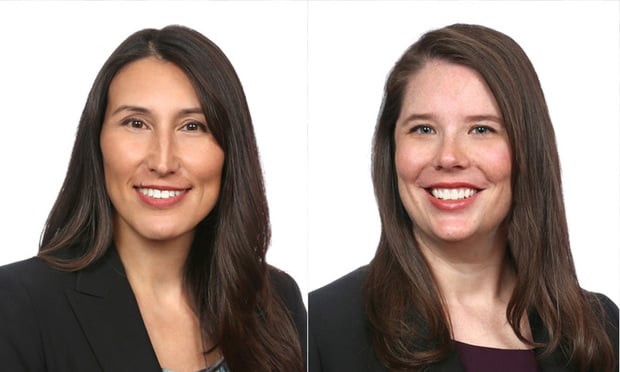The Seven Deadly Sins of Lawyers, No. 4: Gluttony
For attorneys who are trying to grow a practice or to bring in some extra work, there may be a temptation to take on work for which the attorney is not suitably qualified.
February 15, 2019 at 11:53 AM
6 minute read
 Shari Klevens (left) and Alanna Clair, Dentons. (Courtesy photos)
Shari Klevens (left) and Alanna Clair, Dentons. (Courtesy photos)
In the fourth of the series of articles about lawyers' Seven Deadly Sins, this article addresses the professional risks that can arise from gluttony. In the context of law firm management and professional conduct, gluttony is that behavior in which an attorney overindulges or overconsumes, whether it relates to new clients, new types of matters, or even a more traditional vice.
Attorneys are, by nature, competitive and many have a significant drive to succeed. However, those attorneys who do not know when to stop or when to say no can face additional risks.
Duty of Competence
Rule 1.1 of the ABA Model Rules of Professional Conduct provides: “A lawyer shall provide competent representation to a client. Competent representation requires the legal knowledge, skill, thoroughness and preparation reasonably necessary for the representation.”
For attorneys who are trying to grow a practice or to bring in some extra work, there may be a temptation to take on work for which the attorney is not suitably qualified. In such a scenario, an attorney may feel comfortable “learning on the job” for a specific type of matter so that they can earn an additional fee.
There are attorneys whose skills translate into being able to do multiple types of legal work; some areas of the law, however, may be quite niche or require specialized experience. By holding onto representations that exceed the attorney's capability, the attorney may be increasing their risk for a malpractice claim. Indeed, even the most competent and well-qualified attorneys can make mistakes, but a mistake may be claimed by a client to be more pronounced if the attorney was inexperienced in that particular subject matter.
This does not mean that attorneys cannot learn new areas of the law or expand their practice. But it can be helpful for attorneys to review whether they have the experience necessary to take on a novel type of work and the proper support to assist—or whether the attorney is biting off more than they can chew.
Conflicts of Interest
Conflicts of interest can be complicated—and can sometimes keep attorneys from accepting work that they otherwise want to do. However, it can be gluttonous for attorneys to try to represent clients in the face of a conflict of interest. Proceeding with a representation in the face of a conflict of interest calls into question the attorney's duty of loyalty and whether the attorney put his or her own personal interests ahead those of their clients'.
Thus, many law firms require their attorneys to deal with conflicts right away, before the representation begins. Many firms have systems in place to review potential new matters and advise on whether conflicts exist and can be resolved. Some firms will not even permit a new matter to be opened until the conflicts check is resolved. This is because conflicts issues rarely get better as time passes.
Some attorneys may be tempted to ignore a conflict so that they can keep a representation, but such overindulgence can come at a steep cost. Critically, just because a conflict exists does not mean that the representation is over. Indeed, there may be opportunities for waivers or other consent. But willfully ignoring a known conflict of interest creates risk.
Work-Life Balance and Health
Attorneys work hard. Sometimes this drive to work hard at all costs can have steep consequences. Indeed, attorneys who are gluttons for their own work and never take a vacation day or turn off their phone can find themselves negatively affected by the toll that stress can take. Client, peer and self-imposed pressure often creates high stress levels within a law firm and for individual attorneys. While many lawyers are perfectionists in their practice, success in the practice of law can come at the expense of attorneys' own well-being. Burnout is a real thing, and sometimes attorneys need to say “no” to new obligations or expectations for the sake of their mental health.
Attorneys deal with stress in different ways. As a profession, however, lawyers face higher rates of alcohol and drug dependency and mental health issues. The ABA has been galvanized on this issue since the landmark study published in 2016 by the Hazelden Betty Ford Foundation and the ABA's Commission on Lawyer Assistance Programs. This study highlighted troubling trends. According to the study, 21 percent of working attorneys qualify as “problem drinkers,” 28 percent deal with depression, and 19 percent struggle with anxiety issues. The study, which has been widely acknowledged as the most comprehensive of its kind, also showed that attorneys with less than 10 years' experience are the most likely to suffer these problems. Remarkably, nearly 1 in 3 younger lawyers are “problem drinkers.”
In late 2018, the ABA took further steps to ring the alarm for law firms, calling firms to seriously address substance abuse and related mental health issues among their members. In response, several Big Law firms have signed pledges to implement a seven-step plan within their firms to help support attorneys and reduce the risks of substance abuse disorders.
The Well-Being Pledge for Legal Employers asks firms to agree to:
- Provide robust education to attorneys and staff on well-being, mental health and substance use disorders;
- Reduce the expectation of alcohol at firm events;
- Partner with outside providers who are committed to reducing substance use disorders and mental health distress;
- Provide confidential access to addiction and mental health experts and resources;
- Develop proactive policies and protocols to support assessment and treatment;
- Show that the firm's core values include self-care and getting help when needed; and
- Use the pledge to attract and retain the best talent.
In agreeing to this Well-Being Pledge, law firms are taking steps to reduce the stigmas surrounding substance abuse and mental health, and are also expressing solidarity with colleagues who need support.
Shari L. Klevens is a partner at Dentons US in Atlanta and Washington, D.C., and serves on the firm's U.S. board of directors. She represents and advises lawyers and insurers on complex claims and is co-chair of Dentons' global insurance sector team.
Alanna Clair, also a partner at Dentons US in Washington, focuses on professional liability and insurance defense. Klevens and Clair are co-authors of “The Lawyer's Handbook: Ethics Compliance and Claim Avoidance” and the upcoming 2019 edition of “Georgia Legal Malpractice Law.”
Related stories:
The Seven Deadly Sins of Lawyers, No. 3: Lust
This content has been archived. It is available through our partners, LexisNexis® and Bloomberg Law.
To view this content, please continue to their sites.
Not a Lexis Subscriber?
Subscribe Now
Not a Bloomberg Law Subscriber?
Subscribe Now
NOT FOR REPRINT
© 2025 ALM Global, LLC, All Rights Reserved. Request academic re-use from www.copyright.com. All other uses, submit a request to [email protected]. For more information visit Asset & Logo Licensing.
You Might Like
View All
Atlanta Calling: National Law Firms Flock to a ‘Hotbed for Talented Lawyers’
9 minute read

On The Move: Squire Patton Boggs, Akerman Among Four Firms Adding Atlanta Partners
7 minute read
Trending Stories
- 1Trump's Pick for SEC Chair Likely to Stymie Shareholder Proposals from ESG Advocates
- 2Adobe’s Chief Cyber Legal & Privacy Officer Talks Managing Gen AI Risks, Cyber Training
- 3The M&A Partners Who Drove the Most Business as Deal Leads Last Year
- 4Recent Ford Bronco Battery Recall Draws Pa. Class Action
- 5Office of Special Counsel Chief Challenges Firing 'Without Cause'
Who Got The Work
J. Brugh Lower of Gibbons has entered an appearance for industrial equipment supplier Devco Corporation in a pending trademark infringement lawsuit. The suit, accusing the defendant of selling knock-off Graco products, was filed Dec. 18 in New Jersey District Court by Rivkin Radler on behalf of Graco Inc. and Graco Minnesota. The case, assigned to U.S. District Judge Zahid N. Quraishi, is 3:24-cv-11294, Graco Inc. et al v. Devco Corporation.
Who Got The Work
Rebecca Maller-Stein and Kent A. Yalowitz of Arnold & Porter Kaye Scholer have entered their appearances for Hanaco Venture Capital and its executives, Lior Prosor and David Frankel, in a pending securities lawsuit. The action, filed on Dec. 24 in New York Southern District Court by Zell, Aron & Co. on behalf of Goldeneye Advisors, accuses the defendants of negligently and fraudulently managing the plaintiff's $1 million investment. The case, assigned to U.S. District Judge Vernon S. Broderick, is 1:24-cv-09918, Goldeneye Advisors, LLC v. Hanaco Venture Capital, Ltd. et al.
Who Got The Work
Attorneys from A&O Shearman has stepped in as defense counsel for Toronto-Dominion Bank and other defendants in a pending securities class action. The suit, filed Dec. 11 in New York Southern District Court by Bleichmar Fonti & Auld, accuses the defendants of concealing the bank's 'pervasive' deficiencies in regards to its compliance with the Bank Secrecy Act and the quality of its anti-money laundering controls. The case, assigned to U.S. District Judge Arun Subramanian, is 1:24-cv-09445, Gonzalez v. The Toronto-Dominion Bank et al.
Who Got The Work
Crown Castle International, a Pennsylvania company providing shared communications infrastructure, has turned to Luke D. Wolf of Gordon Rees Scully Mansukhani to fend off a pending breach-of-contract lawsuit. The court action, filed Nov. 25 in Michigan Eastern District Court by Hooper Hathaway PC on behalf of The Town Residences LLC, accuses Crown Castle of failing to transfer approximately $30,000 in utility payments from T-Mobile in breach of a roof-top lease and assignment agreement. The case, assigned to U.S. District Judge Susan K. Declercq, is 2:24-cv-13131, The Town Residences LLC v. T-Mobile US, Inc. et al.
Who Got The Work
Wilfred P. Coronato and Daniel M. Schwartz of McCarter & English have stepped in as defense counsel to Electrolux Home Products Inc. in a pending product liability lawsuit. The court action, filed Nov. 26 in New York Eastern District Court by Poulos Lopiccolo PC and Nagel Rice LLP on behalf of David Stern, alleges that the defendant's refrigerators’ drawers and shelving repeatedly break and fall apart within months after purchase. The case, assigned to U.S. District Judge Joan M. Azrack, is 2:24-cv-08204, Stern v. Electrolux Home Products, Inc.
Featured Firms
Law Offices of Gary Martin Hays & Associates, P.C.
(470) 294-1674
Law Offices of Mark E. Salomone
(857) 444-6468
Smith & Hassler
(713) 739-1250






